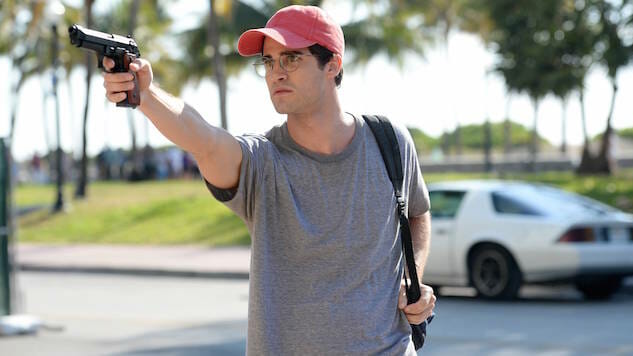American Crime Story‘s Season Opener Beautifully Mines the Tension of Knowing What’s Coming
(Episode 2.01)
Photo: Jeff Daly/FX TV Reviews The Assassination of Gianni Versace: American Crime Story
A man in flowing pajamas ambles through an obscenely opulent villa, murmuring thanks to the silent servant waiting to hand him his orange juice. Nearby, on the beach, another man restlessly unpacks and repacks a backpack containing a biography and a gun.
The first man has breakfast on a patio inlaid with a faux-ancient mosaic of Medusa’s head. The other man vomits in a public restroom whose cubicle wall is etched with a crude drawing of two penises and an exclamation about “faggots.” In a few minutes, fashion designer Gianni Versace (Edgar Ramirez) will be shot twice in the head on the steps of his mansion and Andrew Cunanan (Darren Criss) will be giggling hysterically in the driver’s seat of a parked truck.
Miami Beach, July 1997.
It’s a weird kind of tension, when a director spools out minute after minute of lead-up to something we already know will happen because we remember that it happened. (In case we didn’t remember it, it’s the title of the show.) The pre-credit sequence of The Assassination of Gianni Versace: American Crime Story is wall-to-wall opulence, in its color saturation, its swelling music, its luxuriant pacing. The tension of knowing what’s coming is sometimes even worse than the tension of not being sure.
Once Versace is shot, the show starts going forward, into the investigation, but more significantly, backward, taking us to a 1990 episode in which Cunanan meets Versace in a gay nightclub and manages to score an invitation to the San Francisco Opera, where Versace is pulling a costume design stint. It’s immediately clear that Cunanan is a DSM-worthy example of a sociopath; even his handful of friends seem to get that he’s a pathological liar. Cunanan meets Versace after the performance, they drink Champagne, and Versace possibly ensures his own future demise by assuring Cunanan he will almost certainly “be important one day.”
Meanwhile, in 1997, the police show up and question Versace’s partner, Antonio (Ricky Martin). They seem very hung up on the fact that “other men” were invited home with the couple. It’s confusing, this “gay lifestyle” thing, apparently even in Miami Beach three years from the turn of the millennium. Were they all his “partner”? No? What’s the difference?
“Fifteen years,” Antonio says incredulously, still wearing blood-stained tennis whites, “I lived with Gianni 15 years. That’s the difference.”
The detective concedes that 15 years is a significant amount of time. Somehow they’re not running a particularly effective investigation, though. The FBI shows up, saying they suspect Cunanan. A pawn shop operator (Cathy Moriarty) calls the police to say she’d turned in paperwork days ago from a transaction with Cunanan, and gives them an address.
Versace’s sister, Donatella (Penelope Cruz), shows up, cancels the company’s public offering on the New York Stock Exchange and says they have to keep things in the family because strangers will “judge the killer, but they will also judge the victim.” She rakes poor Antonio over the coals a few times for good measure.
Police storm the address they’ve gotten from the pawn shop, but the man in the seedy hotel room isn’t Cunanan. They’ve lost him.
The Assassination of Gianni Versace is, in its opening episode, richly detailed and quite subtle. I don’t love Cruz as Donatella Versace—was Lady Gaga busy?—but then again, the real Donatella creeps me out, too. Criss, Ramirez and Martin are remarkably good, though. The episode brims with strange tensions, between wealth and non-wealth, status and non-status, and between straight and gay cultures. The 1990 scenes are tinted by the AIDS crisis in a way that feels very authentic and not at all ham-fisted. The spooling out of backstory is occasionally imperfect (usually in expository monologues, not generally in real-time scenes). The 1997 scenes have a real-feeling paparazzi-prurience, evoking our often morbid obsession with celebrity and our often subverted fear of Other-ness. (In one horrible moment, a chubby tourist breaches the police line to soak a Versace magazine ad in the blood still pooled on the steps of the villa.) The time-hopping will, I expect, continue, showing us visions of how both men, killer and killed, became who they were.
We appear to be setting up for a beautifully filmed, opulently styled investigation of self-acceptance, self-loathing, rage and unfulfilled desire. When I Googled Gianni Versace to make sure I had his death date correct, this quote floated up at me: “I am not interested in the past, except as a road to the future.”
I think it’s safe to say we’re going to be on a season-long road to the future.
Amy Glynn is a poet, essayist and fiction writer who really likes that you can multi-task by reviewing television and glasses of Cabernet simultaneously. She lives in the San Francisco Bay Area.